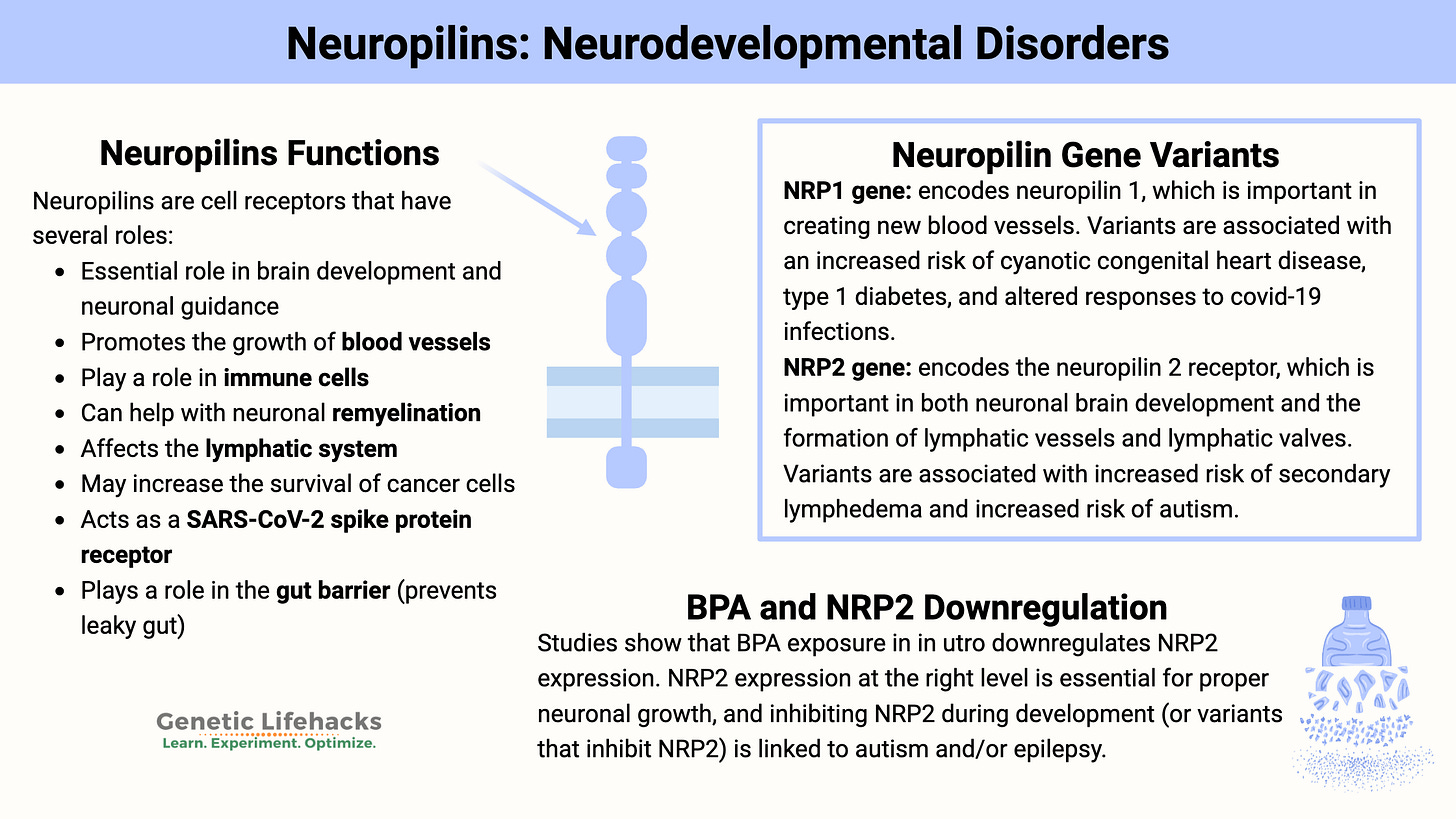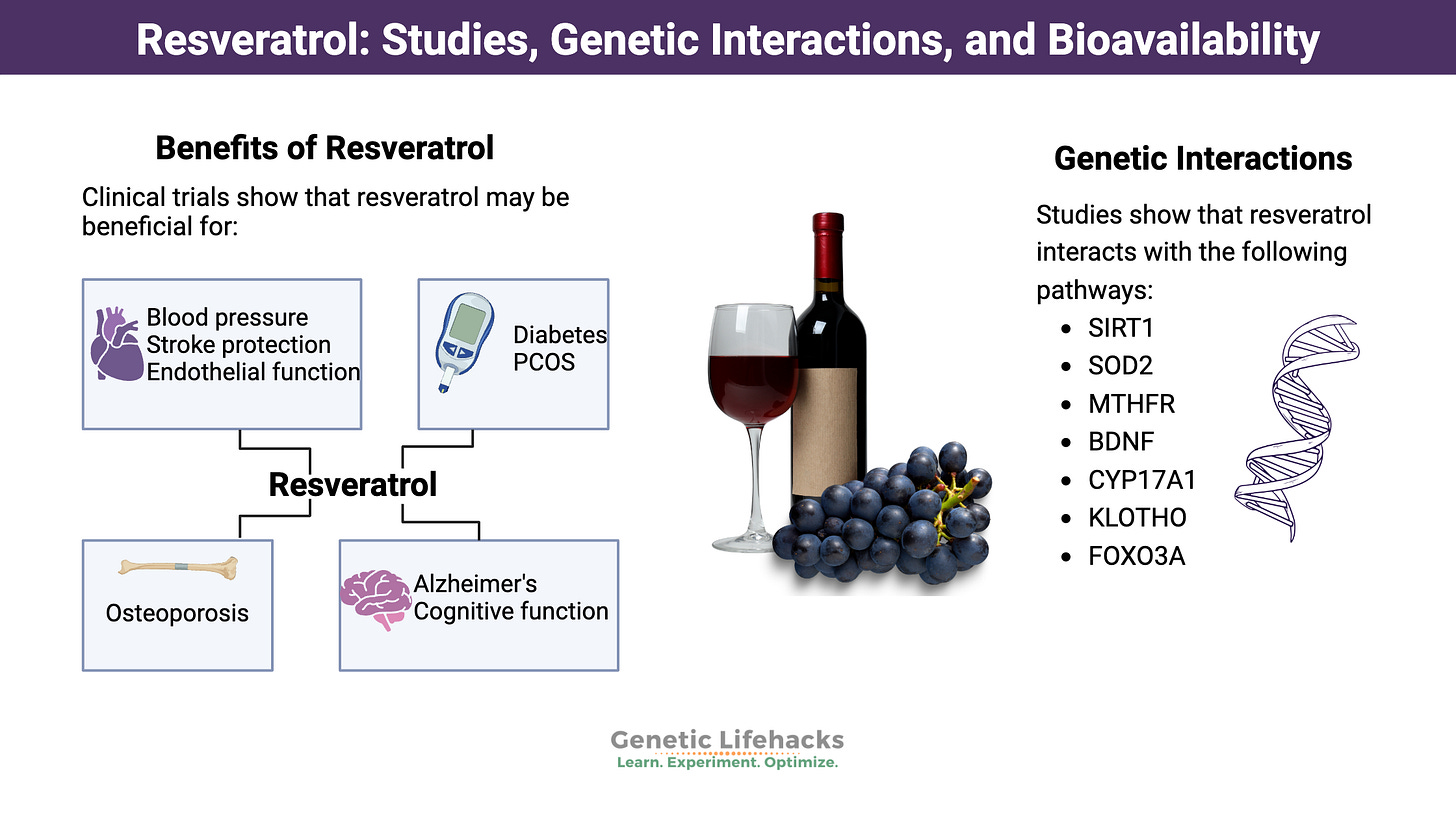Autism is a vastly complex topic that I don't write about often, mainly because I don't want to lead any parent down a wrong path. I know enough to know that I don't know enough to write about it in depth.
This past week, I came across a new research study on autism that linked it to neuropilins, which are proteins that help guide axons to the right place during brain development.
This piqued my interest because I had written a short article on neuropilins a few years ago because they are also cell receptors for the SARS-CoV-2 spike protein.
I've expanded my article on neuropilins, which originally focused mainly on the neurological symptoms of long covid, to include more about the link to autism, as well as the interaction with gut barrier function, the immune system, and mast cells.
Overall, I found it to be a fascinating topic!
However, I don't want to imply that neuropilins are the only genetic pathway related to autism -- this is just one piece of the puzzle.
Also below is a new article on resveratrol. This is a topic that a couple of members have requested, and in the article, I dig into some of the clinical trials as well as the interaction with genetic variants. I hadn't written about resveratrol because I thought it was likely overhyped and an excuse for drinking red wine... I came away impressed with the quality of placebo-controlled clinical trials on it.
Finally, I've adjusted the color scheme of the Genetic Lifehacks website to be warmer colors that reduce blue light and eye strain. I hope you all find this beneficial when reading longer articles or when you are on the site in the evening hours.
Stay curious!
~ Debbie
Neuropilin 1 and Neuropilin 2: From brain development to blood vessels
Key takeaways:
~ Neuropilins (NRPs) are cell receptors that have several roles, including in neuronal development and promoting the growth of blood and lymph vessels.
~ Genetic variants in the neuropilin (NRP1, NRP2) genes are linked to autism, migraines, lymphedema, and heart disease.
~ NRP1 and NRP2 are receptors for SARS-CoV-2.
~ NRPs are located in the endothelium lining blood vessels, on neurons in the brain, and in certain immune system cells — all key locations linked to neurological and long Covid symptoms experienced after exposure to the SARS-CoV-2 spike protein.
In this article, I’ll cover background information on these receptors, along with genetic variants that impact their function.
Neuropilin 1 and Neuropilin 2: From brain development to blood vessels
Neuropilins are glycoproteins, which means structurally, they contain a protein combined with a carbohydrate group. They were originally identified for their role in guiding axons to the right place during brain development. Since then, researchers have discovered many roles for neuropilins. Neuropilins act as receptors and are found on the surface of cells, including on neurons and epithelial cells. [ref]
Neuropilin Functions:
Essential role in brain development and neuronal guidance
Promotes the growth of blood vessels
Play a role in immune cells
Can help with neuronal remyelination
Affects the lymphatic system
May increase the survival of cancer cells
Acts as a SARS-CoV-2 spike protein receptor
Plays a role in the gut barrier (prevents leaky gut)[ref
new article!Resveratrol: Studies, Genetic Interactions, and Bioavailability
Key takeaways:
~ Resveratrol is a polyphenol with antioxidant and anti-inflammatory properties.
~ Studies show benefits from resveratrol for cardiovascular health, metabolic health, bone health, and cognitive function.
~ Resveratrol is absorbed well, but fairly quickly metabolized in the liver.
Resveratrol: Health Benefits and Mechanisms
Resveratrol, a polyphenol found in a variety of plants, has made headlines for its many health benefits.
Resveratrol is found in grape skins and red wine, and it was initially proposed that resveratrol might provide health benefits from drinking red wine. About five decades ago, researchers began looking at resveratrol both for its association with reducing heart disease and for its chemoprotective properties. The initial thought was that resveratrol from wine explained the “French paradox,” which is the low rate of heart disease in French people who also eat a diet high in saturated fat.
There’s currently a bit of controversy about resveratrol — some claim that the research studies have been overblown and the actual benefits are small, while others take it by the spoonful every day for longevity and healthspan.
Luckily, there is a lot of research on resveratrol upon which to base your opinions. Let’s take a look at what the research studies and clinical trial data show:
What I've been reading:
1.) Truefood.tech
This is an interesting database that ranks foods by how processed they are. Lots of 'healthy' brands end up ranking pretty high on the list in terms of how processed they are.
2.) The androgen clock is an epigenetic predictor of long-term male hormone exposure
A new study in PNAS looks at the lifelong effects of androgen hormone levels on biological aging. From the study: "DNA methylation exhibits great plasticity over the lifespan and in response to environmental stimuli, however, the mechanisms underlying these changes are poorly understood. This study introduces a unique epigenetic predictor called the androgen clock, which can measure long-term androgen exposure with striking accuracy. We find that the “ticking” rate of this clock can be completely stopped by removal of the testes and activated in females by administration of synthetic androgens. This ability to precisely manipulate the behavior of an epigenetic clock offers a unique opportunity to understand the mechanistic basis of age-associated DNA methylation changes."







So fascinating, Debbie!!